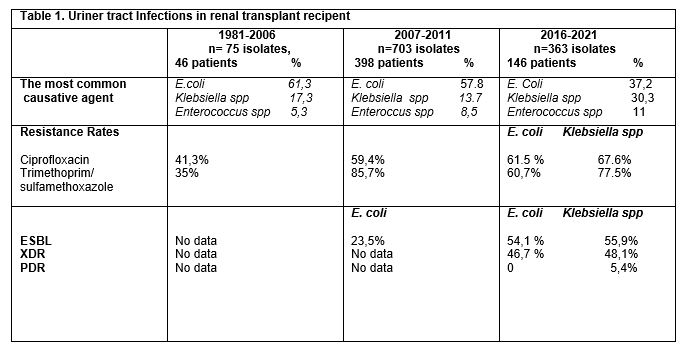Assessment of urinary tract infections microbiologically in kidney transplant recipients
Nuran Sari1, Hande Arslan1, Emre Karakaya2, Mehmet Haberal2.
1Department of Infectious Diseases and Clinical Microbiology, Baskent University, Ankara, Turkey; 2Department of General Surgery, Division of Transplantation, Baskent University, Ankara, Turkey
Introduction: Urinary tract infection (UTI) is the most common infection after kidney transplantation. Urinary tract infections can be easily treated with antibiotics, but on the other hand, they can have devastating effects up to graft loss. Knowledge of the causative agents and resistance rates annually will be a guide for diagnosis and treatment. In our study, the bacteria isolated from renal transplant recipients that were diagnosed as urinary tract ınfections are evaluated in kidney transplant recipients for five years.
Method: Since 3 November 1975 we have performed 3304 kidney transplant. We evaluated 546 renal transplant recipients from January 2016 to May 2021 at our transplant center. We evaluated the data of kidney transplant recipients with urinary tract infections. For this purpose medical reports of the patients were reviewed retrospectively. Demographic and laboratory data of the patients recorded retrospectively and analyzed. We defined the most common causative agents, the rate of resistance to widely used antibiotics (ciprofloksasin, trimethoprim/sulfamethoxazole), the rate of extended-spectrum beta-lactamase (ESBL) positivity, extensively drug-resistance (XDR) and pun drug-resistance (PDR).
Results: In the last five years study period, in 146 of 546 renal transplant recipients had identified 363 urine tract infection episodes. This patients were 84 (57,5%) female and 62 (42.46%) male. The median age was 48 (range 18-68). Isolated bacteria were 291 gram negative, 64 gram positive and 16 Candida spp. 135 (37,2%) of the 363 isolates were Escherichia coli, 110 (30,3%, ESBL 54%) Klebsiella pneumoniae, 40 (11 %) Enterococcus spp. and 1 (3.2%) between 2016-2021 (Table 1).
Conclusion: Enterobacteriaceae are still the organisms most frequently isolated from UTI in renal transplant recipients. The three most common bacteria were E. coli, K.pneumoniae and Enterococcus spp., similar to previous years. However, ciprofloxacin and trimethoprim/sulfamethoxazole resistance increased during this period. In addition, there was also observed a significant increase in rates of ESBL, XDR and PDR within the years. Infections caused by ESBL, XDR/PDR producing Escherichia coli and Klebsiella spp. continue to be a severe problems in renal transplant recipients.



right-click to download
